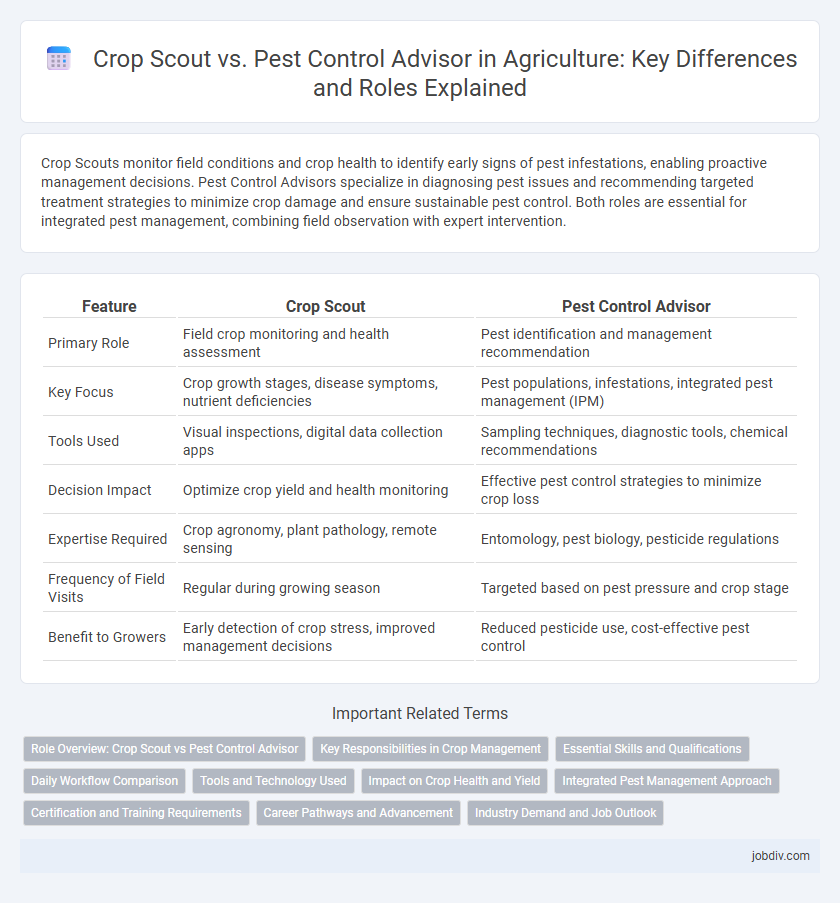Crop Scouts monitor field conditions and crop health to identify early signs of pest infestations, enabling proactive management decisions. Pest Control Advisors specialize in diagnosing pest issues and recommending targeted treatment strategies to minimize crop damage and ensure sustainable pest control. Both roles are essential for integrated pest management, combining field observation with expert intervention.
Table of Comparison
| Feature | Crop Scout | Pest Control Advisor |
|---|---|---|
| Primary Role | Field crop monitoring and health assessment | Pest identification and management recommendation |
| Key Focus | Crop growth stages, disease symptoms, nutrient deficiencies | Pest populations, infestations, integrated pest management (IPM) |
| Tools Used | Visual inspections, digital data collection apps | Sampling techniques, diagnostic tools, chemical recommendations |
| Decision Impact | Optimize crop yield and health monitoring | Effective pest control strategies to minimize crop loss |
| Expertise Required | Crop agronomy, plant pathology, remote sensing | Entomology, pest biology, pesticide regulations |
| Frequency of Field Visits | Regular during growing season | Targeted based on pest pressure and crop stage |
| Benefit to Growers | Early detection of crop stress, improved management decisions | Reduced pesticide use, cost-effective pest control |
Role Overview: Crop Scout vs Pest Control Advisor
Crop Scouts play a crucial role in monitoring crop health by identifying early signs of pest infestations, diseases, and nutrient deficiencies through field observations and data collection. Pest Control Advisors specialize in developing and implementing integrated pest management (IPM) strategies, offering expert recommendations on pesticide use, application techniques, and compliance with agricultural regulations. Both professionals collaborate to optimize crop yield and minimize environmental impact by combining real-time scouting insights with tailored pest control solutions.
Key Responsibilities in Crop Management
Crop Scouts monitor crop health by identifying pest infestations, nutrient deficiencies, and disease symptoms in the field, providing critical data for timely intervention. Pest Control Advisors develop pest management strategies, recommend appropriate pesticides, and ensure compliance with agricultural regulations to protect crops effectively. Both roles collaborate to optimize crop yields and maintain sustainable agricultural practices through precise monitoring and targeted pest control measures.
Essential Skills and Qualifications
Crop Scouts require strong observational skills to identify crop health issues, knowledge of plant pathology, and proficiency in data collection technologies. Pest Control Advisors must possess expertise in integrated pest management, pesticide regulations, and agricultural chemistry, complemented by certification and licensing specific to their state or region. Both roles benefit from strong communication abilities to effectively advise farmers and implement sustainable agricultural practices.
Daily Workflow Comparison
Crop Scouts conduct daily field inspections to monitor crop health, identify pest infestations, and record real-time environmental conditions using mobile data collection tools. Pest Control Advisors analyze crop scout reports, develop targeted pest management strategies, and recommend pesticide applications based on pest thresholds and regulatory guidelines. The daily workflow of Crop Scouts emphasizes data gathering and initial diagnosis, while Pest Control Advisors focus on decision-making and implementing integrated pest management plans.
Tools and Technology Used
Crop Scouts utilize mobile apps and GPS mapping tools to monitor crop health and detect pest infestations in real-time, enabling precise data collection and early intervention. Pest Control Advisors rely on advanced diagnostic equipment, pest identification tools, and pesticide efficacy databases to develop targeted pest management strategies. Both roles integrate remote sensing technologies and digital platforms to optimize crop protection and increase agricultural productivity.
Impact on Crop Health and Yield
Crop Scouts monitor crop fields regularly to detect early signs of pest infestations and diseases, enabling timely interventions that protect crop health and optimize yield potential. Pest Control Advisors develop targeted pest management strategies based on scouting data, applying pesticides and biocontrol measures to minimize crop damage and ensure sustainable crop productivity. Both roles collaborate to maximize crop resilience and enhance overall agricultural output.
Integrated Pest Management Approach
Crop Scouts play a critical role in Integrated Pest Management (IPM) by regularly monitoring field conditions and pest populations, enabling timely detection and data collection for informed decision-making. Pest Control Advisors (PCAs) use this detailed scouting information to develop tailored pest management strategies that minimize chemical usage and promote sustainable practices. Collaborative efforts between Crop Scouts and PCAs enhance the effectiveness of IPM programs by combining accurate field data with expert pest management recommendations.
Certification and Training Requirements
Crop Scouts typically require foundational training in plant pathology and entomology, often obtained through certification programs that focus on field identification and monitoring techniques. Pest Control Advisors must hold state-issued licenses or certifications, which involve rigorous training in pesticide regulations, integrated pest management (IPM), and environmental safety. Certification for Pest Control Advisors generally demands passing comprehensive exams and completing continuing education to maintain expertise in pest control strategies and compliance standards.
Career Pathways and Advancement
Crop Scouts gain hands-on field experience identifying pest issues and monitoring crop health, building a foundation in agronomy and integrated pest management. Pest Control Advisors (PCAs) typically require certification, allowing them to recommend and apply pest control strategies, advancing into roles with greater regulatory responsibilities and agribusiness consulting. Career pathways for both roles offer growth through specialization, with PCAs often ascending to managerial positions or agricultural sales and technical consulting.
Industry Demand and Job Outlook
Crop Scouts and Pest Control Advisors both play crucial roles in modern agriculture, with Crop Scouts primarily monitoring crop health and pest infestations, while Pest Control Advisors develop targeted pest management strategies. Industry demand for Pest Control Advisors is rising due to increased regulatory requirements and integrated pest management practices, leading to a projected job growth rate of 5-7% over the next decade. Crop Scouts experience steady demand in regions with intensive crop production, as their field reports contribute to optimizing yields and supporting sustainable farming.
Crop Scout vs Pest Control Advisor Infographic

 jobdiv.com
jobdiv.com